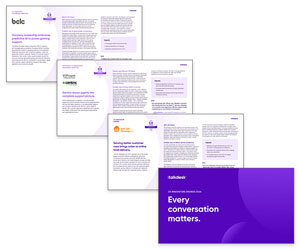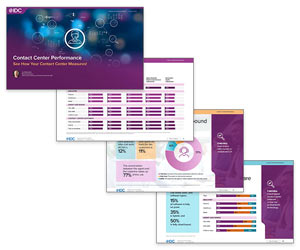Talkdesk’s Celia Cerdeira defines ASR technology and explains how it benefits the contact centre.
Behind Alexa, Siri, and other virtual assistants there’s a technology first created in the 1950s and improved throughout the years called Automated Speech Recognition (ASR).
If you use virtual assistants in your day-to-day life (to schedule meetings, call people, or do grocery shopping), you already know how they can simplify most mundane tasks. But have you considered how ASR can improve the customer experience (CX) in the contact centre?
In this article, we’ll explore:
- What is ASR?
- How does ASR work?
- Types of ASR systems.
- How contact centres can use ASR.
What Is ASR and How Does It Work?
ASR is an AI-powered technology that converts spoken human speech into written text. It is widely used in voice assistants, transcription services, and contact centre systems.
ASR is a subfield of artificial intelligence (AI)—also referred to as “speech-to-text” or “speech recognition”— and uses machine learning algorithms and language models to accurately understand spoken words and convert them into text.
By 2030, the global market for speech recognition technologies is projected to grow from $12.62 billion in 2023 to $59.62 billion.
How Does Automatic Speech Recognition Work?
First, the system takes in an audio recording of someone speaking. It then cleans up the audio by removing background noise and making it easier to understand.
After that, the system analyzes the audio using special models trained on extensive amounts of data. These models help recognize different sounds and words in speech.
To enhance the transcription quality, the system also relies on a language model. This model is built by studying a large amount of written text and helps predict the most likely words based on what it has learned.
It makes sure that the transcribed text makes sense and is coherent. The latest generation of generative AI language models are trained on massive volumes of written text and communicate almost as if they are human
Once the audio has been processed and analyzed, the system generates a written version of the spoken words. This can be shown in real-time as the person is speaking or saved for later use.
ASR technology is vital in enabling voice-based communication between humans and computers. It actively listens to spoken words, converts them into text, and finds various applications in our daily lives.
From answering our questions through voice assistants to efficiently distributing calls in contact centres, it plays a pivotal role.
What Is ASR Used for in Contact Centres?
ASR technology has valuable applications within contact centres:
Real-Time Call Transcription.
ASR provides a real-time transcription of customer–agent conversations, aiding agents in understanding customer requests and resolving issues more effectively.
These transcriptions can then be analyzed to extract valuable insights, identify trends, and monitor the quality of customer interactions.
Contact centres can use this data to improve agent performance, optimize processes, and enhance customer satisfaction.
Call transcription can also be used in the contact centre to automate after-call work, collecting and updating databases and systems with customers’ information.
Speech Analytics.
ASR enables the analysis of transcribed customer interactions, allowing contact centres to gain insights into customer behavior, agent performance, and product feedback.
Speech analytics can examine and assess agents’ and customers’ tones and the topics of conversations, providing agents with prompts for better solving issues .
For example, if a customer complains about not being able to connect a new set of headphones to the computer, the system will identify the product (headphones) and the problem (Bluetooth connection) and automatically prompt the agent with a troubleshooting guide.
Similarly, the customer may be ordering a snowboard jacket for a ski trip. The system recognizes the category (ski apparel) and prompts the agent to complete the sale by introducing goggles and ski helmets in the conversation.
Conflict Resolution.
Handling angry customers can be difficult, even for the most tenured agents. Using ASR, agents can set a trigger for certain words or sentences (unhappy, unacceptable, complaint, etc.) and immediately escalate to the contact centre supervisor or manager.
Call Routing and IVR Systems.
ASR helps automate call routing by understanding customer spoken prompts, improving call efficiency, and directing callers to the appropriate departments or agents.
By analyzing the spoken words and language used by callers, ASR systems can understand the purpose of the call and direct it to the most appropriate department or agent.
Additionally, ASR can be integrated with intelligent virtual assistants to provide self-service options, answer frequently asked questions, and assist agents in real time during customer interactions.
Voice Biometrics.
ASR can be used for speaker identification and verification, enhancing security by analyzing the unique characteristics of a caller’s voice using voice biometrics.
By analyzing unique vocal characteristics, such as pitch, tone, and speech patterns, ASR can authenticate customers without requiring them to provide additional authentication information. This streamlines the authentication process, improves security, and enhances the overall customer experience.
Quality Monitoring and Compliance.
ASR assists in quality monitoring and regulatory compliance by transcribing call recordings for adherence to regulations, internal policies, and quality assurance standards.
By automatically transcribing calls, ASR systems enable contact centre managers to review and analyze interactions to identify any compliance violations, ensure adherence to script guidelines, and address issues related to customer service quality.
Help Enterprises Leverage AI to Deliver Exceptional Customer Experiences
ASR is already an integral part of our life, whether in our houses or offices. Contact centres can now lean on ASR technology to streamline operations and improve efficiency at an affordable price.
By harnessing the power of ASR, contact centres can enhance customer service, streamline processes, analyze data, and uphold compliance standards.
An innovative AI-powered contact centre platform that uses AI and automation to drive exceptional customer outcomes. Some of the top features include Agent Assist, a personalized AI assistant that listens, learns, and assists agents in every conversation, and Interaction Analytics, a feature that captures, transcribes, and analyzes every customer interaction using AI to identify key conversation moments, topics, and sentiment that help agents understand customer intent.
These features help contact centres reduce average handling time, speed up resolution times, and improve first contact resolution, among several other benefits.
FAQs.
Is ChatGPT ASR Technology?
No. ChatGPT is not specifically designed as ASR technology. ChatGPT is a chatbot developed by OpenAI that uses the GPT large language model to generate text-based responses in natural language conversations.
What Is the Difference Between ASR and NLP?
Natural language processing (NLP) and ASR are not the same thing. ASR converts spoken language to text. NLP encompasses broader techniques for understanding and processing human language in both spoken and written forms.
What Is the Difference Between ASR and STT?
While they sound similar, Speech to Text (STT) and ASR are not the same. STT refers to the very specific function of converting voice to text but requires no recognition of the language.
ASR recognizes speech and patterns, analyzes speech in audio, and then performs the function of converting that understanding to text.
This blog post has been re-published by kind permission of Talkdesk – View the Original Article
For more information about Talkdesk - visit the Talkdesk Website
Call Centre Helper is not responsible for the content of these guest blog posts. The opinions expressed in this article are those of the author, and do not necessarily reflect those of Call Centre Helper.
Author: Talkdesk
Published On: 15th Jun 2023 - Last modified: 9th Dec 2024
Read more about - Guest Blogs, Celia Cerdeira, Talkdesk






 Talkdesk is a global customer experience leader for customer-obsessed companies. Our contact center solution provides a better way for businesses and customers to engage with one another.
Talkdesk is a global customer experience leader for customer-obsessed companies. Our contact center solution provides a better way for businesses and customers to engage with one another. 












